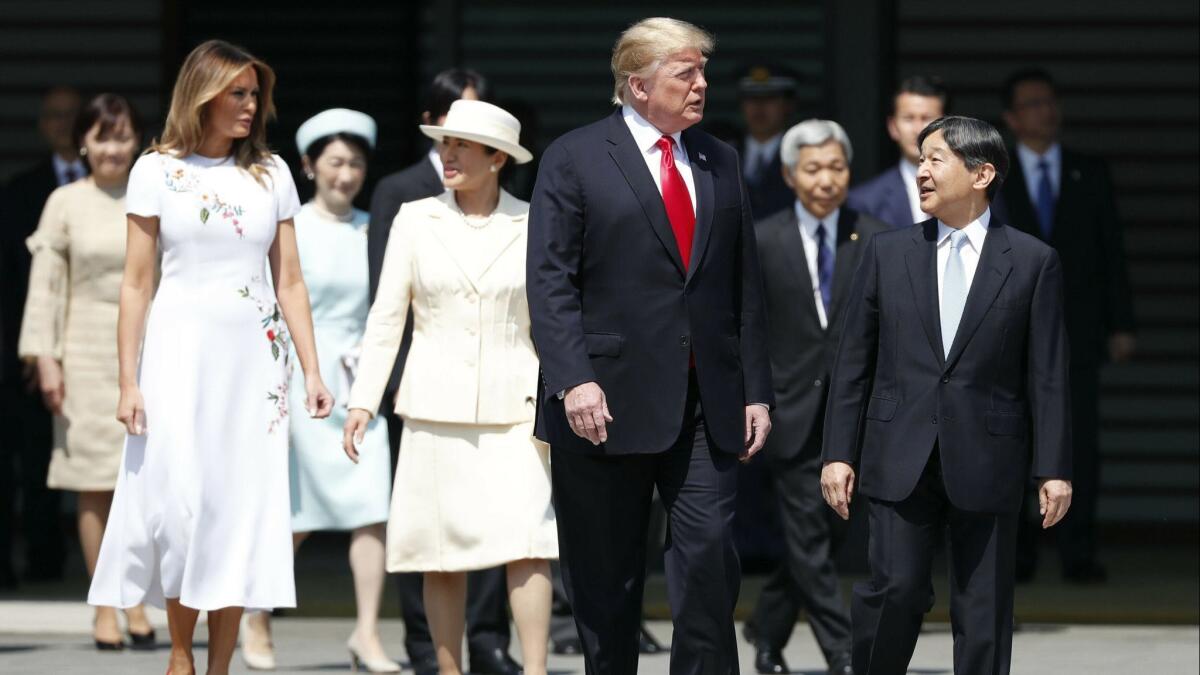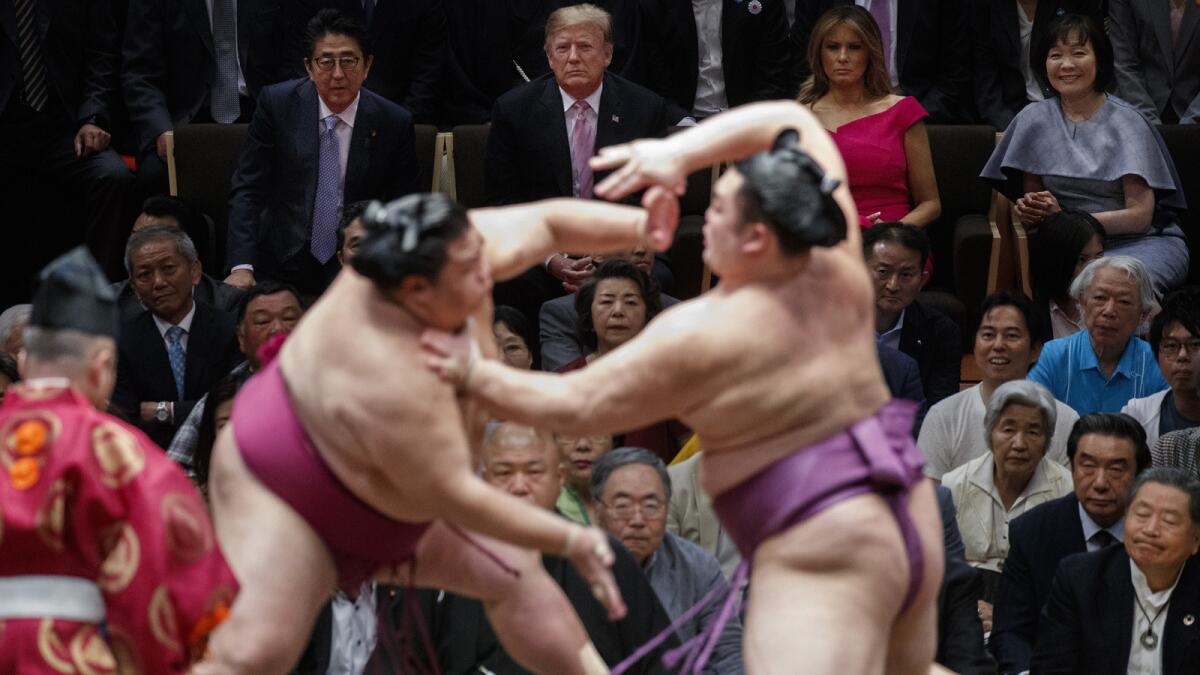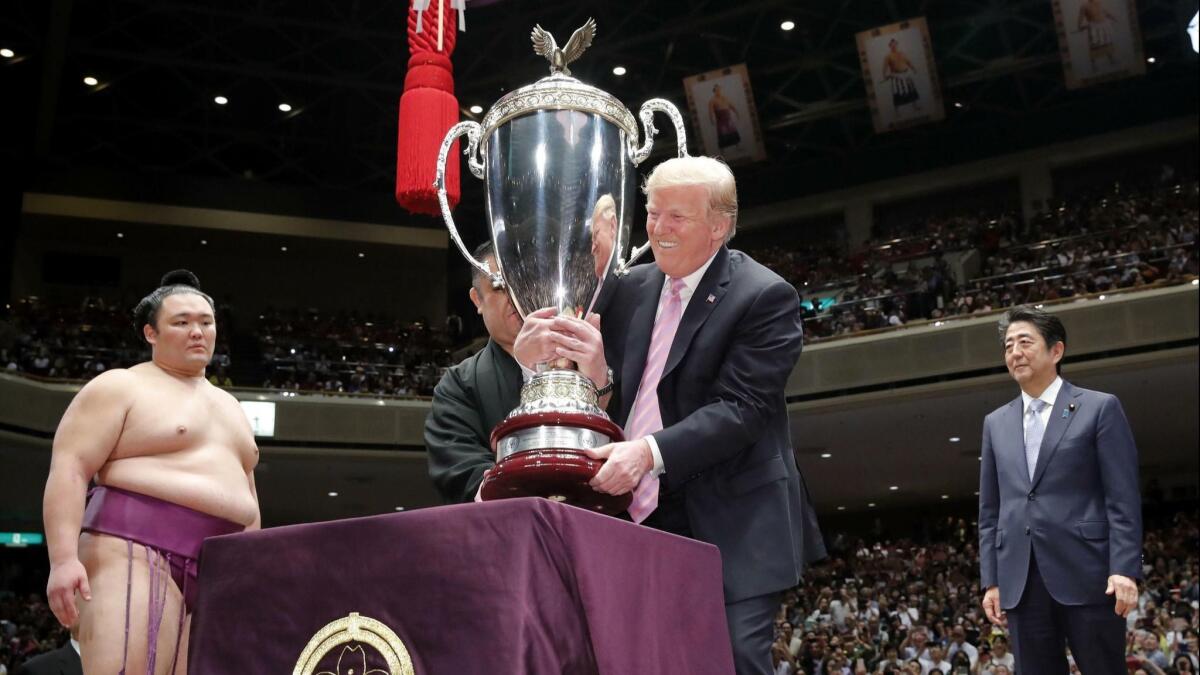Trump downplays North Korea’s missile tests as he visits Japan

- Share via
Reporting from Tokyo — President Trump downplayed North Korea’s missile testing and its potential threat to Japan, saying Pyongyang “seems to have stopped” rocket testing and predicting “lots of good things.”
“I may be right, I may be wrong, but I feel that,” Trump said during a photo session Monday morning with Japanese Prime Minister Shinzo Abe.
Abe, whose government has a less optimistic view of North Korea’s actions, did not respond. Trump’s remarks could heighten anxiety here where officials worry that the president’s desire for close relations with Kim Jong Un, the North Korean leader, could lead to a reduced U.S. commitment to Japan’s defense.
The president offered a similarly optimistic view of relations with Iran, saying that “I do believe Iran would like to talk, and if they want to talk, we’d like to talk.”
It was unclear if Trump was referring to talks between Iran and Japan or potential talks between U.S. and Iranian officials.
“I know for a fact the prime minister is very close with the leadership of Iran,” he said, referring to Abe, suggesting that he welcomed Japan’s efforts to mediate between Washington and Tehran.
“Nobody wants to see terrible things happen, especially me.”
Tensions between the U.S. and Iran have increased dramatically in recent weeks, and the U.S. has moved to increase its military presence near Iran.
Relations with North Korea have not soured to that extent, but talks over that country’s nuclear program broke down after Trump’s summit with Kim in February. North Korea has resumed testing shorter-range missiles that Pentagon officials say appear designed to evade U.S. defenses.
Along with the Japanese, some of Trump’s top aides, including national security advisor John Bolton, view North Korea’s nuclear ambitions as a serious threat. Trump has persistently praised Kim and insisted that the two of them have a strong, personal bond that will ultimately prevail.
Later, during a meeting with relatives of people who have been abducted by North Korea, Trump promised to continue working with Japan to bring the abductees home, a top priority for Abe.
“We’ll work on that together,” Trump said.
Trump’s remarks came after a visit to Japan filled with ceremony and highlighted by his awarding of a trophy to the winner of Tokyo’s Summer Grand Sumo Tournament.
Spectators at the sumo event stood and applauded Sunday as Trump entered from the corner of the ring waving, clapping and pointing to the crowd.
It was a moment much of the Japanese public had waited for: Trump, in a dark suit and pink, striped tie, paying tribute to the traditional Japanese sport of sumo.
It was a rare bit of cultural diplomacy for Trump but perhaps a fitting one. He loves talking about “big guys” and “tough guys” who can fight. He even has a measure of related experience, once body-slamming and shaving the head of promoter Vince McMahon at a WrestleMania event a dozen years ago.
He looked a bit jet-lagged as a series of wrestlers took turns plowing into each other. Trump mostly nodded and occasionally chatted with Abe on one side and First Lady Melania Trump on the other. Abe’s wife, Akie, sat on the other side of Melania.
The sumo match was part of Abe’s sustained effort to charm Trump, which began with a visit to Trump Tower after the 2016 election, before the president was sworn in. Abe has ensured Trump’s comfort at every turn.
Though the country’s cuisine is noted for sea urchin and taro root, Trump was served an American-raised beef hamburger at the golf course where the two played before the sumo match and vanilla ice cream for dessert later at a hibachi dinner.
Trump was not only the first American president to award a sumo trophy, he is also the first foreign leader to have an audience with the newly enthroned Emperor Naruhito.
That came Monday morning in Tokyo, as Trump visited the lush, green Imperial Palace grounds, walking with Naruhito as children in yellow hats waved flags in a vast courtyard and a military band played the U.S. and Japanese anthems. Melania Trump walked behind them with Empress Masako.
Trump gave the honor guard a slight bow, following protocol, but shook hands Western style with the Emperor. A pooled video of the event appeared to show him saying to Naruhito that his ascension to the throne was a tremendous accomplishment noted around the world.
But the protocol accomplishments have outweighed the trip’s tangible results. Trump said he does not expect to strike a trade deal until August, at the earliest, leaving in place the threat of automobile tariffs that could cripple Japan’s industry.
Trump also embarrassed Abe earlier in the day with a tweet that minimized recent North Korean missile tests as “small weapons, which disturbed some of my people, and others, but not me.”
Abe and Bolton have called the tests a violation of a United Nations resolution, and the issue causes deep anxiety in Japan, which is in easy striking distance.
In the same tweet, Trump sided with Kim in a war of words with former Vice President Joe Biden, writing that he “smiled” when Kim’s government called Biden “a low IQ individual, & worse.” It’s rare, if not unprecedented, for an American president to attack a political rival while abroad, much less siding with a brutal autocrat.
Later, in another tweet, Trump further entangled his Japanese hosts in American partisan politics, citing unnamed people to claim an improbable statement. “Numerous Japanese officials,” he wrote, had told him: “Democrats would rather see the United States fail than see me or the Republican Party succeed.”
But Sunday evening in Tokyo all that was set aside, if only briefly, for the rituals of sumo, somewhat adapted for the visiting American. The four dignitaries were the only spectators not seated on traditional tatami floor mats. Instead, they rested on special, wide cushioned armchairs with back support in their ringside seats and were provided with slippers, though shoes of any kind are usually prohibited in the arena. For security reasons, the fans were warned not to throw their seat cushions, a custom during exciting moments in the match, according to the Japan Times.
The suspense of the tournament had already vanished a day earlier when Asanoyama, a 25-year-old weighing 390 pounds, clinched his first title by winning enough match points. The wrestler, whose non-sumo name is Hiroki Ishibashi, was an unknown underdog and was clearly moved, shedding tears before the trophy presentations as the Japanese national anthem played.
By winning the tournament, Asanoyama won several trophies. Before Trump could present his, Asanoyama was awarded the Emperor’s Cup and the Prime Minister’s Cup.

Abe put pressure on Trump by bending over and lifting the heavy Prime Minister’s Cup and handing it to Asanoyama. Trump, who hates to appear weak, clenched his teeth over his lower lip and grabbed his cup too. But before he could lift it, he got an assist from a floor official who helped him carry the trophy, which the White House said weighed 60 to 70 pounds. The silver cup, with gold trim and a soaring eagle perched atop the spout, stands 54 inches tall, the White House said.

The excitement over Trump’s attendance at the sumo match could help him build a stronger connection with the Japanese, who have been captivated by the event and are generally more open to his politics than Europeans, who have greeted him with protests during foreign trips. As his motorcade proceeded from his hotel to the arena, crowds lined the streets and people waved from their balconies.
Earlier in the day, the President’s Cup trophy, which many dubbed the “Trump Cup,” attracted a crowd of media and onlookers who snapped pictures as it sat on display beside blue hydrangeas in the lobby of the Palace Hotel, where Trump is staying.
Trump, who dined at a hibachi restaurant with Abe after the match, called the fighters “great athletes” and marveled at the honor he said he had experienced in witnessing “a very ancient sport” that “I’ve always wanted to see.”
“Hopefully, for many hundreds of years, that will be their trophy for the championships,” he said of the President’s Cup.
More to Read
Get the L.A. Times Politics newsletter
Deeply reported insights into legislation, politics and policy from Sacramento, Washington and beyond. In your inbox three times per week.
You may occasionally receive promotional content from the Los Angeles Times.











